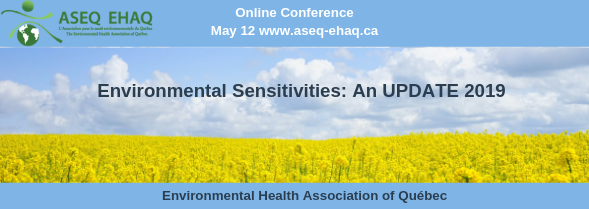Online conference of May 12, 2019

Environmental Sensitivity Awareness Day – May 12, 2019
Welcome to our conference for May 2019!
ASEQ-EHAQ is pleased to provide you with updated information on environmental sensitivities.
As in the past years, the videos will remain online on our website for viewing at any time. Kindly share and post on your social media. Remember to ‘like’ us on Facebook.
Donations above $10 will receive a charitable receipt for income tax purposes.
Conferences

John Molot, MD
MCS 2019 Update: What’s New Since 2018?
Numerous papers have been published supporting a biological explanation for MCS.
These will be reviewed as well as the evolving medical and political perspective.

David Fancy, Ph.D
Electrical Hypersensitivity and the Social Model of Disability
The most common way of thinking about EHS is that it is a medical disability. Understanding EHS in these terms means understanding the specific physiological pathways that cause what is generally understood to be a ‘pathological’ condition. Although this kind of understanding is necessary and useful, there are other important ways of conceiving of EHS. What if we were to flip the script? What if we understood the disability to be the result of the inaccessibility of the spaces that EHS people find themselves in, instead of a limitation or sickness of the EHS person? Drawing from insights from the ‘social model of disability’ this presentation identifies how the current cultural moment presents systematic barriers, negative attitudes and ongoing electromagnetic wounding that puts the responsibility on society for being the main contributing factor in disabling EHS persons.

Meg Sears, Ph.D
Why are more Canadians getting chronically sick? – Modernizing exposures assessment and regulation
Canada has laws that are meant to protect human and environmental health. Meg Sears PhD will review research showing increasing chronic ill health, such as diabetes, obesity, autism, birth defects, infertility, allergic and autoimmune diseases, some cancers and other conditions associated with disruption of cellular signalling or hormone systems. Common exposures associated with these effects may also precipitate and then trigger environmental sensitivities. Sears reveals how flaws in scientific processes permit this unsustainable situation and discusses how the necessary considerations may be incorporated into chemicals management. Sears notes the urgency of curbing harmful products and thus chronic disease because as people are getting sicker, families and society also suffer and the healthcare budget balloons faster than the Gross Domestic Product – clearly an unsustainable situation.
